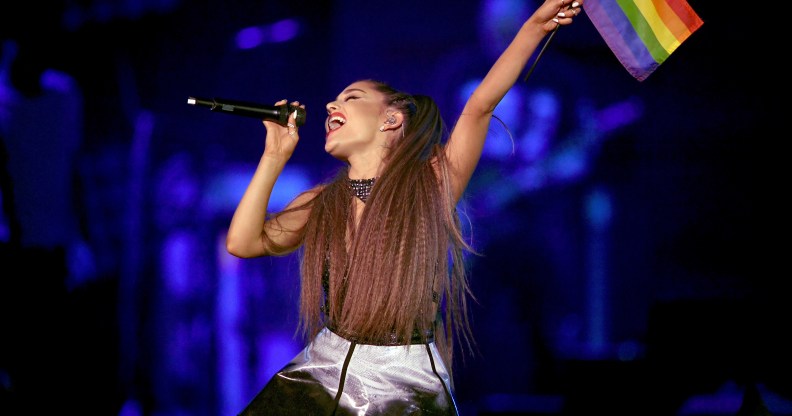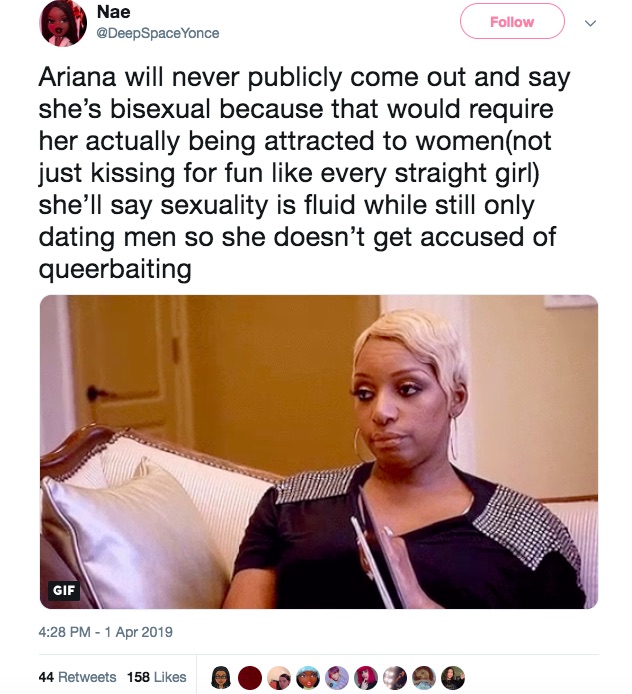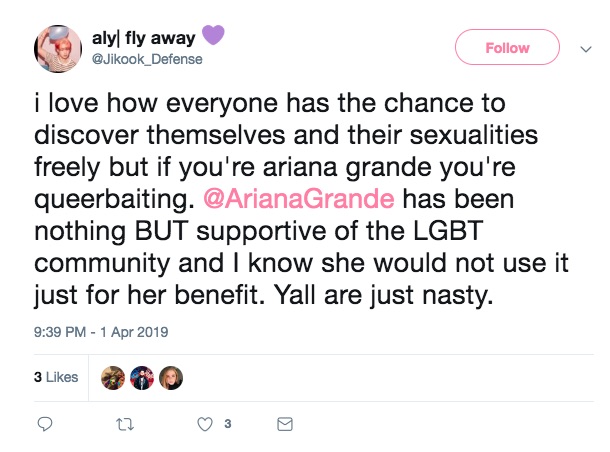Ariana Grande accused of ‘queerbaiting’ in new song ‘Monopoly’

LOS ANGELES, CA – JUNE 02: (EDITORIAL USE ONLY. NO COMMERCIAL USE) Ariana Grande performs onstage during the 2018 iHeartRadio Wango Tango by AT&T at Banc of California Stadium on June 2, 2018 in Los Angeles, California. (Photo by Kevin Winter/Getty Images for iHeartMedia)
Ariana Grande has divided gay Twitter with her latest track “Monopoly,” with some accusing her of “queerbaiting” and others defending the star for “showing that sexuality is fluid.”
Grande, 25, collaborated with her friend Victoria Monét for new song “Monopoly,” released on Monday (April 1) which features Grande singing the line: “I like women and men.”
Monét, who is openly bisexual, also raps the lyric.
The track led to some fans discussing the Grande’s sexuality online, with the singer saying on Monday that she does not “feel the need” to label herself in response to a fan on Twitter.
Ariana Grande is accused of treating bisexuality as a “joke”
However, some social media users have accused Grande, who is headlining Manchester Pride in August, of “queerbaiting”—the practice of faking a same-sex romance or attraction in a bid to attract an LGBT+ fanbase.
“Can Ariana Grande stop queerbaiting and treating bisexuality like it’s some cute f*ckin joke for straight women to play with???”
—Twitter user
“Ariana will never publicly come out and say she’s bisexual because that would require her actually being attracted to women(not just kissing for fun like every straight girl),” one Twitter user wrote.
“She’ll say sexuality is fluid while still only dating men so she doesn’t get accused of queerbaiting.”

(DeepSpaceYonce/Twitter)
Another person said: “While it is absolutely valid to keep your identity ambiguous and stray from labels, when it’s being presented in such a fashion it can come off as queerbaiting.
“The way ariana speaks about this kind of thing always tends to insinuate, but never flat out confirm.”
And a third person, who identifies as bisexual in their profile, wrote: “Can Ariana Grande stop queerbaiting and treating bisexuality like it’s some cute f*ckin joke for straight women to play with??? Thank u, next .”
Fans defend Ariana Grande for “expressing her sexuality”
Still, some fans sprung to Grande’s defence, saying that the singer should not be pressured into labelling herself or identifying with a specific sexuality.
“I love how everyone has the chance to discover themselves and their sexualities freely but if you’re ariana grande you’re queerbaiting,” said one fan on Twitter.
“@ArianaGrande has been nothing BUT supportive of the LGBT community and I know she would not use it just for her benefit. Yall are just nasty.”
Another fan said there was an element of sexism behind the criticism of Grande.
“@ArianaGrande has been nothing BUT supportive of the LGBT community and I know she would not use it just for her benefit.”
—Twitter user
“[I don’t know] what the truth is regarding ariana grande’s sexuality but what i DO know is that if certain male artists sang the line ‘i like women and men’ it would be taken at face value, there would be 8 dozen celebratory twitter moments and a floral patterned statue erected,” the Twitter user wrote.
And a third fan posted: “I’m so proud of Ariana for expressing her sexuality and showing that sexuality is fluid.”
As well as addressing her sexuality, Grande also “liked” a tweet from a fan that read: “Hope y’all know sexuality is fluid and no one has to ‘come out’ as anything if they don’t want to.”

(Jikookdefense/Twitter)
The singer’s brother Frankie Grande, meanwhile, cryptically posted on Instagram on Monday (April 1): “Why pick a color… when you can be the rainbow? ”
The release of “Monopoly” comes after the music video for her song “Break Up With Your Girlfriend, I’m Bored,” in which Grande is shown flirting with model Ariel Yasmine, who is also her lookalike.
Fans also speculated about Grande’s sexuality after the release of her hit song “Thank U, Next,” reportedly because Apple Music accidentally transcribed a lyric in which the star referred to herself as “Ari,” instead briefly recording the name as “Aubrey.”
Grande recently defended herself against accusations that she is exploiting the LGBT+ community when she was announced as the headline act at Manchester Pride 2019, with organisers being criticised for more than doubling the price of tickets compared to the previous year.
At the time, the singer stressed that the “lgbtq community has been so special to me and supportive throughout my entire career.”
She went on to comment on her sexuality, adding: “I want to celebrate and support this community, regardless of my identity or how people label me.
Grande has maintained a close relationship with the northern English city after her concert at Manchester Arena in May 2017 was targeted by a suicide bomber, which left 22 people dead.
In her response to the Manchester Pride criticism, Grande said: “Also i wanna visit a city that means so much to me.”

